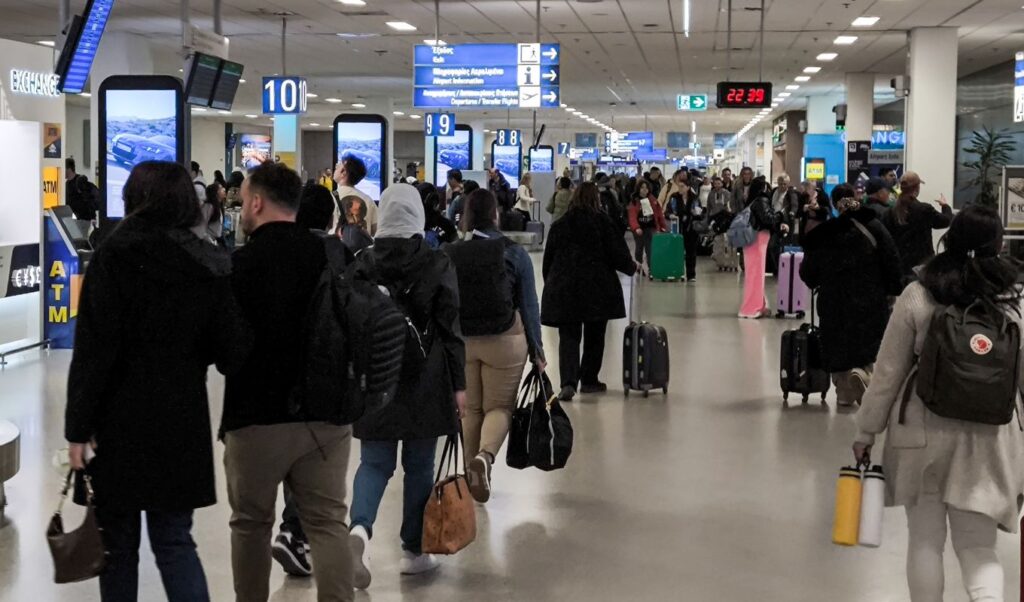Athens International Airport “Eleftherios Venizelos” operates with arrival caps, while flight delays have become a daily occurrence. Air traffic controllers’ president Panagiotis Psarros, speaking on “Parapolitika 90.1”, blamed the Ministry of Transport for indifference. “Venizelos has a capacity of 22 arrivals per hour. Through superhuman effort we managed to serve up to 36, to reduce delays. But this cannot continue. If the state doesn’t act immediately, the situation will become explosive,” he stressed.
Mr. Psarros clarified that controllers have been working extra shifts since 2022, with the agreement that it was a temporary solution. “We’ve reached 2025 and they tell us we’ll continue until 2028. Nothing has changed. No staffing, no equipment. Only promises,” he said pointedly on the show “First Plan” with Alexandros Klossa. Despite announcements for new hires, the new controllers, as he said, will be ready in two years, while the new Aranda system –if signed now– won’t be available before summer 2029. “If we wait another four years to modernize, then the problem won’t be solved, it will grow gigantic,” he warned.
The controllers’ president also criticized the Ministry of Transport’s draft bill that went to consultation: “Instead of aligning with European regulations, it goes in the wrong direction. We make proposals, but nobody listens. And it’s not a trade union issue – we’re copying EU regulations.”
“Munich serves 58 arrivals per hour comfortably, because it has the systems and staff. We at Venizelos barely reach 28 safely. If we keep pushing the limits, soon we won’t be able to respond at all,” Mr. Psarros said meaningfully.
He continued “97 hires will be made in the coming days, 72 people at the beginning of next year who will however deliver in two years from today at the earliest. In equipment we’re still struggling to sign basic contracts for the radar system which even if we signed tomorrow morning we would have by the end of ’28 so we’re heading for summer ’29. We had made an agreement to serve 28 arrivals instead of 22 but because demand is large and growing every year we served daily, especially this summer 30-32, reaching up to 36 arrivals for one hour and for this reason delays were somewhat mitigated because they can’t be eliminated because demand is so large that whatever we offer with existing systems delays can’t be eliminated. What we do we do to give time to fix things, what we see is that essentially both the Civil Aviation Authority and the ministry are complacent. The climax was when we saw the Transport Ministry’s draft bill where essentially we saw that instead of becoming a European provider as European regulations mandate, we see a draft bill that doesn’t go in this direction and is even worse than what they showed us in early July. There we understood that the effort beyond the increased doesn’t work because everyone is complacent, the problem intensifies and if it’s forgotten again next year the problem will be so difficult that whatever we do delays will be like today’s and even worse so we don’t help solve the problem.”
Moreover, the air traffic controllers’ president emphasized that “there’s no safety issue because we keep the limit where it’s safe.”
Subsequently, Mr. Psarros said “Munich airport which is technologically much more advanced than Venizelos, with proper staffing and proper procedures and moreover Venizelos is a copy of Munich in design while we nominally serve 22 and increased 28 and the best we’ve done touched 36, colleagues there serve 58 arrivals nominally because they have the systems and staff to do it safely. We to have the same safety as Munich are forced to serve fewer arrivals and there are delays.”
Asked why they continue to serve 36 arrivals per hour, he answered “We can’t systematically do 36 because the limit is 28 because it’s also the guaranteed one that can be continuous. You understand that this extra difference reduces delays but we now consider it futile, it’s like giving an alibi to continue not solving the problem.”
To continue then “The problem isn’t the increase (in salaries), the problem is that there are European regulations that someone must finally respect. The European Commission itself has made observations that in many points are in the same direction as ours but haven’t been heard. A draft bill has come down where they don’t listen, we make proposals nothing is heard. We’re not reducing our productivity, we’re stopping doing what’s beyond even the agreed. For the minister to focus on our compensation while having so many open problems means he hasn’t understood the problem. I think it’s misleading and disappointing for us because he doesn’t identify the problem.”
Finally, Mr. Psarros emphasized that “for the next 2-3 years no matter how much overtime we work there will be delays because the system couldn’t reach European system levels in time, 25 years now. It’s humanly impossible not to have delays in the coming years.”




